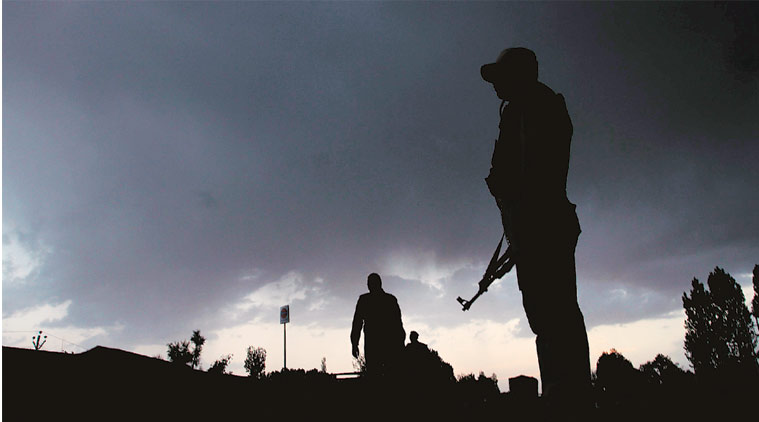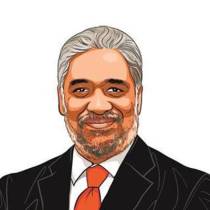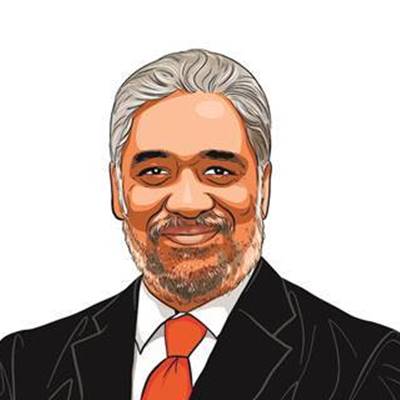Raja Mandala: When guns fall silent
Ceasefires in Kashmir, Kabul may reinforce peace sentiment in the Subcontinent, open up space for politics and diplomacy.

Singh signalled willingness to talk to the Hurriyat, but he has been ambivalent about resuming peace negotiations with Pakistan. Delhi continues to insist that export of terror must stop before the resumption of dialogue.
This year’s Ramzan is raising hopes for peace, if only temporary, in the Subcontinent’s two intractable conflicts in Kashmir and Afghanistan. Unexpected cessation of military operations, initiated unilaterally by Delhi and Kabul, may have opened space for some political and diplomatic activity in both the conflicts.
Pessimists would scoff at the possibilities. But optimists would bet on the new factors at play. One centres around the Pakistan army, a critical player in both conflicts. Since early this year, the Pakistan army chief, General Qamar Javed Bajwa, has been signalling interest in engaging India and promoting peace in Afghanistan.
Rawalpindi’s credibility in Delhi and Kabul may not be very high. But we have seen some interesting things happen in the last few weeks. Following a hotline conversation initiated by the Pak army DGMO with his Indian counterpart in Delhi at the end of May, the two sides agreed to fully implement the 2003 ceasefire agreement all along the international border and the Line of Control in Kashmir.
It may be interesting that the Pakistani initiative came days after Delhi announced a unilateral cessation of operations against the militants in Kashmir during the holy month of Ramzan. After Home Minister Rajnath Singh’s visit to Kashmir, the Union government could take a decision on whether to extend the ceasefire after Ramzan. Singh signalled willingness to talk to the Hurriyat, but he has been ambivalent about resuming peace negotiations with Pakistan. Delhi continues to insist that export of terror must stop before the resumption of dialogue.
The political movement has been more dynamic in Afghanistan. Last week, the Ashraf Ghani government announced a unilateral ceasefire beginning Tuesday. But the government and allied forces will continue to fight the Islamic State. If Kabul’s move was a surprise, the response of the Taliban has caught most observers off-guard. In a statement over the weekend, the Taliban ordered its fighters “to stop offensive operations against Afghan forces for the first three days of Eid-al-Fitr”. The Taliban had added two caveats. The Taliban will defend itself if under attack and the ceasefire does not apply to foreign forces in Afghanistan.
This is the first time the Taliban has ever announced a ceasefire. But analysts expect some violence to continue. If there is a significant reduction in violence in the coming days, it would be seen as an important gesture from the Taliban and its backers in Rawalpindi.
That Washington has been mounting pressure on Pakistan to stop destabilising Afghanistan and Kashmir over the last one year is not a secret. In his South Asia policy articulated last summer, President Donald Trump had warned Pakistan to stop supporting terror groups on its soil or face the consequences. The US has begun to cut its assistance to Pakistan and put Islamabad on the watchlist of the international Financial Action Task Force (FATF) earlier this year. The FATF is expected to meet later this month to review Pakistan’s actions on eliminating its financial support to terror groups.
Trump also freed the US security forces in Afghanistan from multiple constraints imposed by the Obama administration to turn the heat on the Taliban. The Trump administration has bet that by intensifying the diplomatic pressure on Pakistan and military pressure on the Taliban, it can alter the dynamics of the conflict and create the basis for a political process in Afghanistan. A few days ago, the commander of the international forces in Afghanistan, General John Nicholson, declared that the administration’s strategy is beginning to show results. He also revealed that there is a lot of the diplomatic activity and a dialogue at various levels between the Taliban and the Afghan government.
Although the Taliban has denied the talks, President Ghani’s peace offer last February had begun to generate some pressure on the Taliban transmitted through Rawalpindi. Ghani’s proposal included many measures, including ceasefire, release of prisoners, recognition of the Taliban as a political formation, direct talks and changes in the Afghan constitution.
In the last few days, the US Secretary of State Mike Pompeo was on the phone with General Bajwa. He was reportedly discussing the peace process between Pakistan and Afghanistan. Last week, the point person for US South Asia policy at the White House, Lisa Curtis, underlined Trump administration’s expectations from Pakistan. Curtis said the administration has asked Rawalpindi for “assistance in facilitating a peace process and we have sought to understand Pakistan’s own core security concerns and ensure that its interests are taken into account in any peace process”. But she insisted that “we have to be clear that Pakistan’s interests are not served by a Taliban resurgence in Afghanistan”. Pakistan has a fundamental responsibility to address the use of its territory by these malign actors, Curtis argued.
The resurgence of the Taliban is certainly not in the interest of China, whose influence in Pakistan has grown significantly in the last few years. Beijing was quick to welcome Ghani’s ceasefire offer and called for talks between Kabul and the Taliban. Media reports from Pakistan say China played a key role in getting the Taliban to respond with its own ceasefire offer.
As we get closer to Ramzan celebrations this week, there is speculation that more steps could follow, for example on prisoner exchange. Both Kabul and the Taliban have called for such a move. Meanwhile, Delhi’s decision to extend the ceasefire in Kashmir could reinforce the peace sentiments across the Subcontinent. While the hopes for a durable peace might be premature, the conflicts in Kashmir and Afghanistan might be entering a new phase in their long and depressing history.
The writer is director, Institute of South Asian Studies, National University of Singapore and contributing editor on international affairs for The Indian Express.
For all the latest Opinion News, download Indian Express App
More From C. Raja Mohan
- Reading the Singapore Summit statement: Three principles and one political gestureIn the course of one morning in Singapore, US President Donald Trump and the North Korean leader Kim Jong-un have begun to loosen a deeply…
- Donald Trump-Kim Jong meet: Suspense in SingaporeGiven the history and personalities involved, it is difficult to be overly hopeful about Trump’s meeting with Kim Jong-un today. But a breakthrough could change…
- From Indo-Pacific to EurasiaIndia is one of the few powers straddling maritime and continental coalitions. Delhi needs to be nimble-footed. ..








































No hay comentarios:
Publicar un comentario